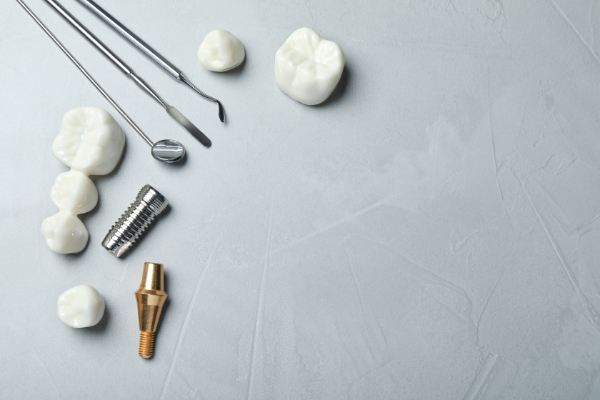How a Dental Crown Is Used for a Damaged Tooth

A dental crowns is a device used to restore the functions and look of a tooth that has been damaged. If you need a root canal, a fractured tooth, or a big filling, your dentist may also decide to place a dental crown. The new crown covers the part of the tooth visible above the gums.
How is a dental crown used to restore a damaged tooth?
Dental crowns are permanently bonded to teeth that are severely decayed, fractured, or damaged. They cover the whole region of the natural tooth's crown that is above the gum line. Dental crowns are created to fit the patient's tooth and can be composed of various materials, including porcelain, composite resin, and gold.
Dentists use crowns for various purposes. They can prevent a cracked tooth from additional deterioration, strengthen a weak tooth, support a tooth with big fillings, and restore the form of a damaged tooth. The crown is a restoration that supports and replaces the tooth structure that has been damaged. When a crown is bonded to a broken tooth, it effectively becomes a part of the tooth and helps to keep it together.
A dentist usually recommends crowns to restore the function, form, look, and alignment of a damaged tooth. It is the only visible part of the tooth once it is in position. They are designed to blend in with the rest of the teeth and are usually undetectable. Crowns are made of strong and long-lasting materials so they can withstand the pressure of chewing and biting.
The dental crown placement
The soft tissues around the tooth that will receive the dental crown will be numbed with a local anesthetic by the dentist. They will remove a portion of the tooth enamel on both sides with a dental drill to make room for the new crown. If a portion of the present tooth's structure is missing, the dentist may fill up the gaps to provide a solid foundation for the dental crown. Following that, the dentist will take imprints of the teeth and send them to a dental lab, which will manufacture the crown.
After receiving the patient's tooth impressions, the dental lab will construct the crown in around two weeks. The dentist will offer a temporary crown to safeguard the tooth while it is being made. When the permanent crown is ready, a second appointment will be required. Next, the dentist will remove the temporary crown and fit the new one properly to the tooth and bite.
When the dentist is happy with the tooth's alignment, dental cement will firmly attach the crown to the tooth. The cement drying process ensures that the crown is securely attached.
The bottom line
If you currently have a tooth that is damaged, cracked, or decayed, it is a good idea to schedule a consultation appointment with a dentist as soon as possible. They will assess your situation and recommend the appropriate treatment.
Request an appointment here: https://summitdentist.com or call Summit Dentist at (908) 698-4229 for an appointment in our Summit office
Check out what others are saying about our dental services on Yelp: Dental Crowns in Summit, NJ.
Related Posts
Individuals suffering from damaged or unsightly teeth may benefit from receiving dental crowns. This straightforward and relatively common procedure can help restore the look and function of healthy, natural teeth. While a variety of components may be used to form dental crowns based on the patient's individual preferences and needs, the installation process is usually…
If you have an extensively decayed tooth or the filling applied is too big for your tooth to support it, your dentist will probably recommend putting in a dental crowns. This is a prosthesis designed to look like a natural tooth, but it is hollow inside to fit over the damaged tooth. In addition to…
Although a dental crown is essentially a false tooth, dentists have ways to ensure that the crown looks as natural as real teeth. In most cases, dental crowns look natural due to the talent of the particular dentist. Once a dental crown is placed upon an original tooth, it is usually difficult to distinguish between…
Dental bridges are a reliable solution for replacing missing teeth and restoring a complete smile. With several types available, it is important to understand the options and choose the one that best meets your needs. A general dentist can explain the different types of bridges and guide you toward the most appropriate choice.Dental bridges are…


